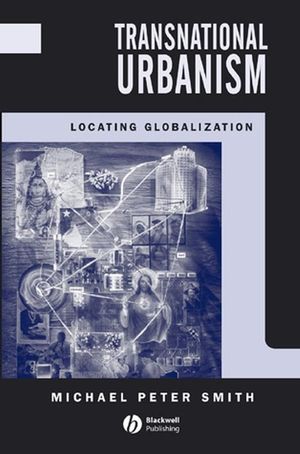Transnational Urbanism: Locating GlobalizationISBN: 978-0-631-18424-9
Paperback
236 pages
October 2000, Wiley-Blackwell
 This is a Print-on-Demand title. It will be printed specifically to fill your order. Please allow an additional 10-15 days delivery time. The book is not returnable.
|
||||||
"Michael Peter Smith has been one of the leading theorists in
urban affairs for many years. This book takes him to a new level,
ranking him at the very top with Harvey and Castells. Smith's
reconceptualization of globalization and his insistence on a more
precise language - transnational urbanism - is groundbreaking. This
book stands as an influential intellectual statement that other
scholars will be obliged to take into account for many years."
Dennis Judd, Urban Affairs Review
"Smith rightly insists that we need to look behind the mantras
of 'globalization,' 'capital,' 'global cities,' and
'postmodernity'. He provides a highly persuasive argument for the
recognition of human agency, locality and the growth of cultural
practices from below. This is a major work - Smith has succeeded in
returning urban theory to the streets where it belongs." Robin
Cohen, University of Warwick
"Countering the structural tendencies of urban political
economists, the ahistoricism of globalists, and the abstractions of
postmodernists, Smith presents "transnational urbanism" as a
cultural metaphor for an agency oriented urban theory. Cities are
the primary sites of transnational urbanism –a pervasive and
complex process involving cultures, policies, institutions, actors,
and localities. Smith's is the most balanced theoretical approach
to globalization, seeing it as it works, without any vilification
or glorification. This is an important book in the field for
graduate students and faculty." Choice
"Since 1979, when he published The City and Social
Theory, Michael Peter Smith has been providing us with close
readings of the writings of urban theorists. Transnational
Urbanism is one of the strongest of these offerings, dissecting
the hidden agendas and limitations of theories of globalization and
rescuing the city from globalization's clutches.The value of
Smith's ethnographic social constructionism.depends neither on
devastating critiques nor sole possession of the space of urban
theory. With insight and persuasion, Smith has made a powerful case
for a transnational urbanism." Urban Affairs Review
"This is a powerful and important book. The arguments, subtle
but significant to the evolution of our understanding of global
systemic change, are compelling. Smith deepens our conceptual
sophistication on globalization, sociospatial dynamics, the role of
the urban in international relations, and the mechanisms of agency
in a world where forces appear to be beyond our control. Smith has
given us a significant work, insightful.in its critique of the
social evolutionism literature that has dominated this first phase
of our struggle to locate globalization." International
Affairs
"[T]his is a book to be recommended. Ably supported by
well-chosen cases and vignettes, Smith's argument injects a
constructive element into the debate about the local and the global
in what is altogether a stimulating read." Environment and
Planning A
"Transnational Urbanism is an impressive book. It offers a state-of-the-art theoretical treatise on globalization and the city, which even those sceptical that new terms and novel methods can save globalization theory from its conceptual morass will gain much from reading." -- Environment and Planning B: Planning and Design



